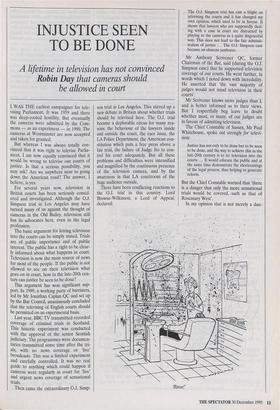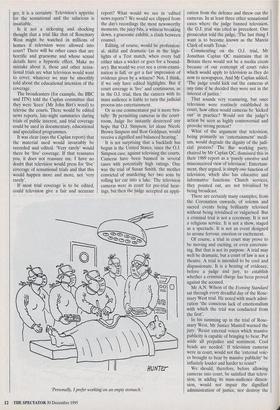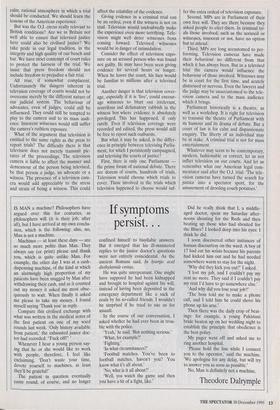INJUSTICE SEEN TO BE DONE
A lifetime in television has not convinced
Robin Day that cameras should
be allowed in court
IWAS THE earliest campaigner for tele- vising Parliament. It was 1959 and there was deep-rooted hostility. But eventually the cameras were admitted by the Com- mons — as an experiment — in 1990. The cameras at Westminster are now accepted and taken for granted.
But whereas I was always totally con- vinced that it was right to televise Parlia- ment, I am now equally convinced that it would be wrong to televise our courts of justice. Is that a serious possibility, you may ask? Are we anywhere near to going down the American road? The answer, I believe, is yes.
For several years now, television in British courts has been seriously consid- ered and investigated. Although the O.J. Simpson trial in Los Angeles may have turned many of us against the thought of cameras in the Old Bailey, television still has its advocates here, even in the legal profession.
The basic argument for letting television into the courts can be simply stated. Trials are of public importance and of public interest. The public has a right to be clear- ly informed about what happens in court. Television is now the main source of news for most of the people. If the public is not allowed to see on their television what goes on in court, how in the late-20th cen- tury can justice be seen to be done?
This argument has won significant sup- port. In 1989, a working party of barristers, led by Mr Jonathan Caplan QC and set up by the Bar Council, unanimously concluded that the televising of English courts should be permitted on an experimental basis.
Last year, BBC TV transmitted recorded coverage of criminal trials in Scotland. This historic experiment was conducted with the approval of the senior Scottish judiciary. The programmes were documen- taries transmitted some time after the tri- als, with no news coverage or 'live' broadcasts. This was a limited experiment and carefully controlled. It was no real guide to anything which could happen if cameras were regularly in court for 'live' and urgent news coverage of sensational trials.
Then came the extraordinary O.J. Simp- son trial in Los Angeles. This stirred up a new debate in Britain about whether trials should be televised here. The O.J. trial became a deplorable circus for many rea- sons: the behaviour of the lawyers inside and outside the court, the race issue, the LA Police Department, the American con- stitution which puts a free press above a fair trial, the failure of Judge Ito to con- trol his court adequately. But all these problems and difficulties were intensified and magnified by the continuous presence of the television camera, and by the awareness in that LA courtroom of the huge audience outside.
There have been conflicting reactions to the O.J. trial in this country. Lord Browne-Wilkinson, a Lord of Appeal, declared:
The O.J. Simpson trial has cast a blight on televising the courts and it has changed my own opinion, which used to be in favour. It shows that lawyers who are supposedly deal- ing with a case in court are distracted by playing to the cameras in a quite disgraceful way. This does not lead to the fair adminis- tration of justice ... The O.J. Simpson case became an obscene jamboree.
Mr Anthony Scrivener QC, former Chairman of the Bar, said (during the O.J. Simpson case) that he supported television coverage of our courts. He went further, in words which I noted down with incredulity. He asserted that 'the vast majority of judges would not mind television in their courts'.
Mr Scrivener knows more judges than I, and is better informed as to their views. But I respectfully beg leave to doubt whether most, or many, of our judges are in favour of admitting television.
The Chief Constable of Sussex, Mr Paul Whitehouse, spoke out strongly for televi- sion:
Justice has not only to be done but to be seen to be done, and the way to achieve this in the late-20th century is to let television into the courts ... It would educate the public and at the same time demonstrate the shortcomings of the legal process, thus helping to generate reform.
But the Chief Constable warned that 'there is a danger that only the more sensational trials would be covered, such as that of Rosemary West'.
In my opinion that is not merely a dan-
`Rinse!'
ger, it is a certainty. Television's appetite for the sensational and the salacious is insatiable.
Is it not a sickening and shocking thought that a trial like that of Rosemary West might be watched in millions of homes if television were allowed into court? There will be other cases that are horrific and gruesome and whose sexual details have a hypnotic effect. Make no mistake about it, those and other sensa- tional trials are what television would want to cover, whatever we may be smoothly told about the educational intention of the coverage.
The broadcasters (for example, the BBC and ITN) told the Caplan committee that they were 'keen' (Mr John Birt's word) to televise the courts. There would be edited news reports, late-night summaries during trials of public interest, and trial coverage could be used in documentary, educational and specialised programmes.
It was clear (says the Caplan report) that the material used would invariably be recorded and edited. 'Very rarely' would there be 'live' coverage. If that reassures you, it does not reassure me. I have no doubt that television would press for 'live' coverage of sensational trials and that this would happen more and more, not 'very rarely'.
If most trial coverage is to be edited, could television give a fair and accurate report? What would we see in 'edited news reports'? We would see clipped from the day's recordings the most newsworthy moments, the juicy bits, a witness breaking down, a gruesome exhibit, a clash between counsel.
Editing, of course, would be profession- al, skilful and dramatic (as in the high- lights of a Test match, when every ball either takes a wicket or goes for a bound- ary). But would we ever see a cross-exami- nation in full, or get a fair impression of evidence given by a witness? Not, I think, if we only have edited highlights. But if court coverage is 'live' and continuous, as in the 0.J. trial, then the camera with its mass audience is liable to turn the judicial process into entertainment.
Or as one commentator put it more bru- tally: 'By permitting cameras in the court- room, Judge Ito instantly destroyed any hope that Q.J. Simpson, let alone Nicole Brown Simpson and Ron GoIdtuan, would receive a dignified and balanced hearing.'
It is not surprising that a backlash has begun in the United States, since the O.J. Simpson case, against televising the courts. Cameras have been banned in several cases with potentially high ratings. One was the trial of Susan Smith, the mother convicted of murdering her two sons by rolling her car into a lake. The television cameras were in court for pre-trial hear- ings, but then the judge accepted an appli-
'Personally, I prefer working on an empty stomach.' cation from the defence and threw out the cameras. In at least three other sensational cases where the judge banned television, the 0.J, trial was cited as precedent. One prosecutor told the judge, The last thing I want is to become known as the Marcia Clark of south Texas.'
Commenting on the O.J. trial, Mr Jonathan Caplan QC maintains that in Britain there would not be a media circus because of our contempt of court rules which would apply to television as they do now to newspapers. And Mr Caplan added, `The judge could kick out the cameras at any time if he decided they were not in the interest of justice.'
That sounds very reassuring, but once television were routinely established in court, how often would cameras be 'kicked out' in practice? Would not the judge's action be seen as highly controversial and provoke strong protest?
What of the argument that television, being primarily an 'entertainment' medi- um, would degrade the dignity of the judi- cial process? The Bar working party, chaired by Mr Caplan QC, dismissed this in their 1989 report as a 'purely emotive and misconceived view of television'. Entertain- ment, they argued, is simply one function of television, which also has educative and informative functions. Church services, they pointed out, are not trivialised by being broadcast.
There are certainly many examples, from the Coronation onwards, of solemn and sacred events being brilliantly televised without being trivialised or vulgarised. But a criminal trial is not a ceremony. It is not a religious service, It is not a show, staged as a spectacle. It is not an event designed to arouse fervour, emotion or excitement.
Of course, a trial in court may prove to be moving and exciting, or even entertain- ing. But that is not its purpose, A trial may well be dramatic, but a court of law is not a theatre. A trial is intended to be cool and dispassionate. It is a hearing of evidence, before a judge and jury, to establish whether a criminal charge has been proved against the accused.
Mr A.N. Wilson of the Evening Standard sat through every dreadful day of the Rose- mary West trial. He noted with much admi- ration 'the conscious lack of emotionalism with which the trial was conducted from the first'.
In his summing up in the trial of Rose- mary West, Mr Justice Mantel! warned the jury: 'Resist external voices which massive publicity is capable of bringing to bear. Put aside all prejudice and sentiment. Cool heads are needed.' If television cameras were in court, would not the 'external voic- es brought to bear by massive publicity' be infinitely louder and harder to resist?
We should, therefore, before allowing cameras into court, be satisfied that televi- sion, in adding its mass-audience dimen- sion, would not impair the dignified administration of justice, nor destroy the calm, rational atmosphere in which a trial should be conducted. We should learn the lessons of the American experience.
But was the O.J. circus really relevant to British conditions? Are we in Britain not well able to ensure that televised justice here could also be civilised justice? We take pride in our legal tradition, in the integrity and high quality of our bench and bar. We have strict contempt of court rules to protect the fairness of the trial. We insist that press freedom should not include freedom to prejudice a fair trial.
All true, if somewhat complacent. Unfortunately the dangers inherent in television coverage of courts would not be overcome merely by the different nature of our judicial system. The behaviour of advocates, even of judges, could still be influenced. They could still be tempted to play to the camera and to its mass audi- ence. Innocent witnesses would still suffer the camera's ruthless exposure.
What of the argument that television is entitled to the same rights as the press to report trials? The difficulty there is that television does not merely transmit pic- tures of the proceedings. The television camera is liable to affect the manner and demeanour of the person being televised, be that person a judge, an advocate or a witness. The presence of a television cam- era would add appreciably to the stress and strain of being a witness. This could affect the reliability of the evidence.
Giving evidence in a criminal trial can be an ordeal, even if the witness is not on trial. Television would undoubtedly make the experience even more terrifying. Tele- vision might well deter witnesses from coining forward. Televised witnesses would be in danger of intimidation.
Consider the effect of television expo- sure on an accused person who was found not guilty. He may have been seen giving evidence for several hours or longer. When he leaves the court, his face would be familiar to millions after a televised trial.
Another danger is that television cover- age, especially if it is 'live', could encour- age witnesses to blurt out irrelevant, scurrilous and defamatory rubbish in the witness box where evidence is absolutely privileged. This has happened, if only rarely. Even if television coverage were recorded and edited, the press would still be free to report such outbursts.
But what, it may be asked, is the differ- ence in principle between televising Parlia- ment, for which I persistently campaigned, and televising the courts of justice?
First, there is only one Parliament the prime forum of national debate. There are dozens of courts, hundreds of trials. Television would choose which trials to cover. Those involved in the trials which television happened to choose would suf- fer the extra ordeal of television exposure.
Second, MPs are in Parliament of their own free will. They arc there because they asked people to elect them. In criminal tri- als those involved, such as the accused or witnesses, innocent or not, have no option but to attend.
Third, MPs are long accustomed to per- forming. Television cameras have made their behaviour no different from that which it has always been. But in a televised trial the camera would influence the behaviour of those involved. Witnesses may be in court for the first time, and acutely distressed or nervous. Even the lawyers and the judge may be unaccustomed to the tele- vision camera and to the mass audience which it brings.
Parliament historically is a theatre, as well as a workshop. It is right for television to transmit the theatre of Parliament with its humour and its drama of debate. But a court of law is for calm and dispassionate enquiry. The liberty of an individual may be at stake. A criminal trial is not for mass entertainment.
Whatever may seem to be contemporary, modern, fashionable or correct, let us not inflict television on our courts. And let us remember what one American legal com- mentator said after the O.J. trial: 'The tele- vision cameras have turned the search for justice into a spectator sport, for the amusement of drooling couch potatoes.'




















































 Previous page
Previous page